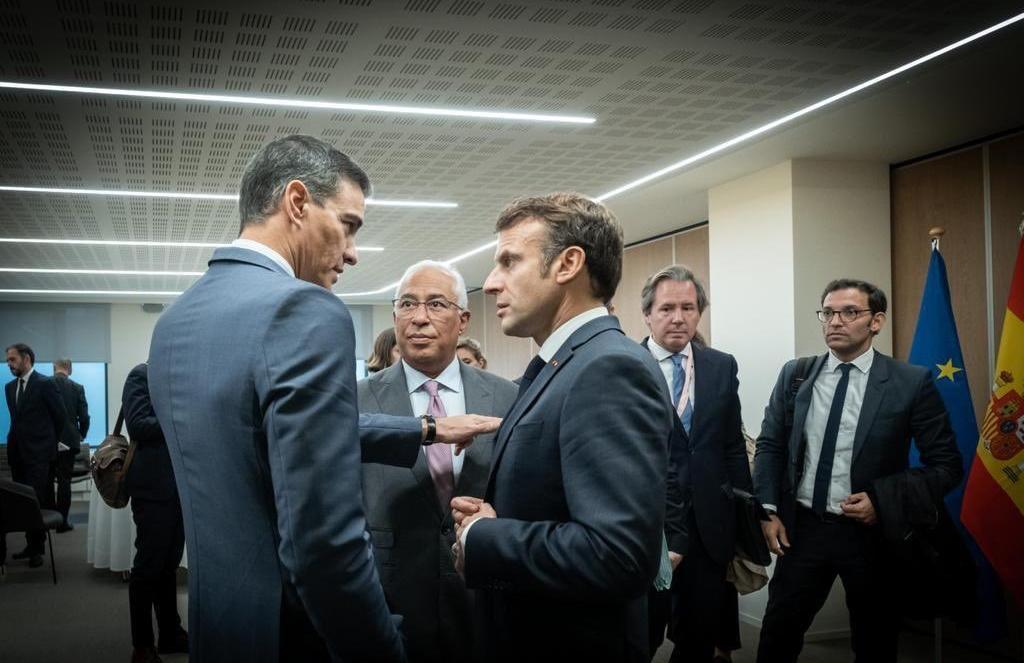Thessaloniki gets ready for its metro launch in November
The underground rapid transit lines have been under construction for almost two decades due to various project delays
 TheMayor.EU logo
TheMayor.EU logo 
Spanish PM Pedro Sánchez speaking to French President Emanuel Macron and Portuguese PM Antonio Costa last week, Source: Governo de Portugal
Out with MidCat, in with BarMar
The European Commission has expressed cautious optimism and support for the newest energy infrastructure initiative on the continent, called BarMar green energy pipeline.
Last week, the leaders of Portugal, Spain and France agreed to build the new pipeline, which will connect the Iberian Peninsula to the European energy market. The project took its name from the two port hubs that will serve as the terminal points for the sub-marine pipeline – Barcelona and Marseille.
BarMar is meant to replace the previous MidCat project, which was also a pipeline meant to bring gas from Africa to Europe via Catalonia. The new infrastructure, however, is much more palatable to leaders as it corresponds to the goals for the energy transition in addition to the provision of energy independence from unreliable suppliers like Russia.
MidCat was Promoted by Spain and Portugal with the support of Germany, which consumes a lot of gas and has urgent supply needs. It was however opposed by the French government. Paris saw it as expensive infrastructure, possibly requiring years of construction and without strategic value, given EU commitments to reduce fossil fuel consumption.
The BarMar, on the other hand, seems to be more aligned with the energy transition plans. The pipeline will in fact be used to transport green hydrogen (a fuel that does not emit greenhouse gases, produced by renewable electricity) and other renewable gases such as biomethane.
The new corridor could take 5 to 7 years to build, and for a short period of time, the BarMar will also carry a "limited amount" of natural gas to alleviate the European supply crisis.
European leaders are awaiting the technical details of the project to evaluate whether the proposal can receive EU funding, as was announced today by energy spokesperson Tim McPhie, during the Commission's daily midday briefing.
European legislation allows institutions to fund projects related to hydrogen, as opposed to fossil fuels.

The underground rapid transit lines have been under construction for almost two decades due to various project delays

Now you can get your wine in Talence by paying directly in Bitcoin

That’s because the state has to spend money on updating the railway infrastructure rather than subsidizing the cost of the popular pass

Rethinking renewable energy sources for the urban landscape

The examples, compiled by Beyond Fossil Fuels, can inform and inspire communities and entrepreneurs that still feel trepidation at the prospect of energy transition

Now you can get your wine in Talence by paying directly in Bitcoin

The 10th European Conference on Sustainable Cities and Towns (ESCT) sets the stage for stronger cooperation between the EU, national and local level to fast track Europe's transition to climate neutrality.

At least, that’s the promise made by the mayor of Paris, Anne Hidalgo

The underground rapid transit lines have been under construction for almost two decades due to various project delays

At least, that’s the promise made by the mayor of Paris, Anne Hidalgo

Hostal de Pinós is located in the geographical centre of the autonomous region

Despite its church-y name, the district has long been known as the hangout spot for the artsy crowds

Urban dwellers across the EU are having a say in making their surroundings friendlier to people and the environment.

Forests in the EU can help green the European construction industry and bolster a continent-wide push for architectural improvements.

Apply by 10 November and do your part for the transformation of European public spaces

An interview with the Mayor of a Polish city that seeks to reinvent itself

An interview with the newly elected ICLEI President and Mayor of Malmö

A conversation with the Mayor of Lisbon about the spirit and dimensions of innovation present in the Portuguese capital














